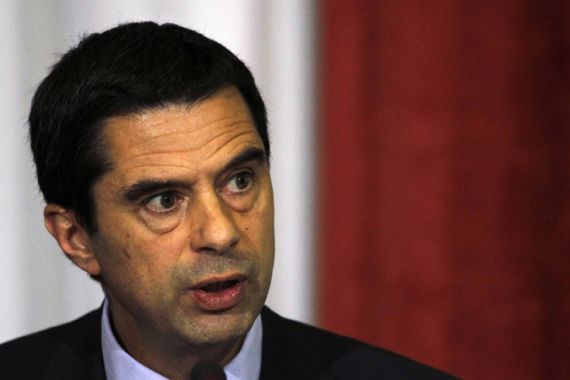Portugal outlines proposed tax increases
Move replaces previous plan that had to be abandoned in the face of widespread opposition and anti-austerity protests.

Portugal has adopted sweeping tax increases to meet budget goals set as conditions for its international rescue.
The move will help the indebted country check falling revenues due to a recession that is set to push unemployment to further record highs.
Keep reading
list of 4 itemsWho benefits from US tariffs on Chinese imports? Experts weigh in
Biden slaps new tariffs on Chinese imports, ratcheting trade war
One of the biggest hurdles for athletes on the Olympic path: Money
Portugal also returned to bond markets for the first time earlier on Wednesday since it sought $101bn bailout last year, swapping short for longer-dated debt to buy time to fix its public finances.
The country’s worst recession since the 1970s could deepen if the tax increases further undermine consumer confidence.
There is also a danger that raising taxes could lead to more opposition to austerity measures that have already included salary cuts and spending cuts.
“We are confronting a critical moment,” Vitor Gaspar, the finance minister, said as he detailed the tax rises introduced by the government after it abandoned a previous tax plan in the face of mass protests.
“It is fundamental that we maintain our current path to overcome our difficulties,” the minister said.
Gaspar outlined tax rises across the board for 2013, including income and property taxes, plus a new tax on financial transactions.
The average income tax rate will rise to 11.8 per cent from 9.8 percent currently and an additional 4 per cent tax surcharge will be levied on incomes in 2013.
The government said the measures, which will also include spending cuts, will amount to 3 per cent of gross domestic product next year, and raised its estimate for unemployment to 16.4 per cent from its current record level of 15 per cent.
“These are tough measures, probably worse for the public sector than the private, and protests will probably go on, but I don’t think there will be any backing off by the government this time,” said Antonio Costa Pinto, political scientist at the University of Lisbon.
Investors pleased
Gaspar maintained the government’s forecast of a three per cent slump in gross domestic product this year and a decline of one per cent in 2013.
Investors welcomed the country’s first venture into the bond market since last year’s bailout, easing Portugal’s debt repayments next year.
The IGCP debt agency sold $4.86bn of October 2015 bonds, exchanging them for debt maturing in September 2013.
The swap to extend the debt maturity follows similar operations by fellow bailout recipient Ireland.
The head of the IGCP debt agency, Joao Moreira Rato, said “this marks a first step for Portugal to regain access to medium- and long-term debt markets”.
Under Portugal’s bailout, the country was expected only to return to finance itself in bond markets in the second half of 2013.
Buying up the September 2013 bond now, before it matures, will help the country’s financing needs next year. The amount it swapped represented 39 percent of the outstanding amount of the September maturity – the first not fully covered by the bailout.